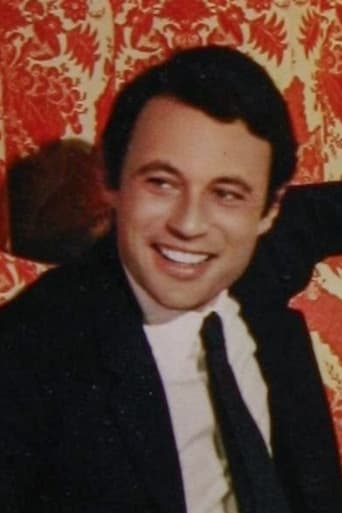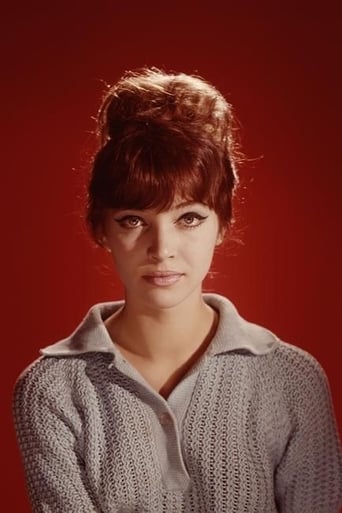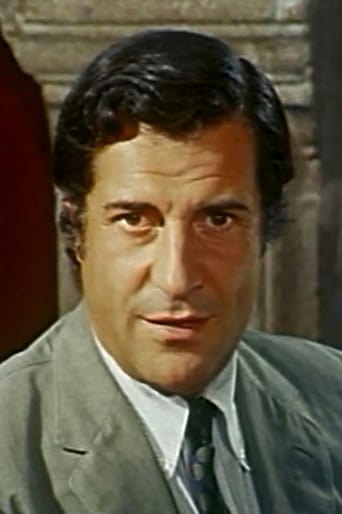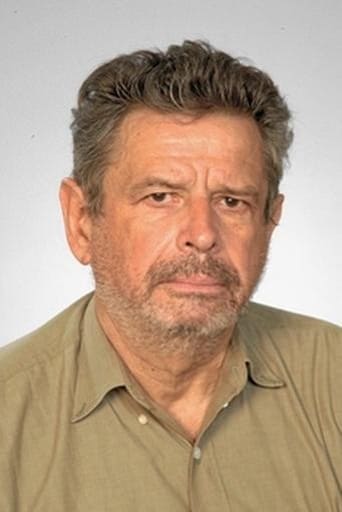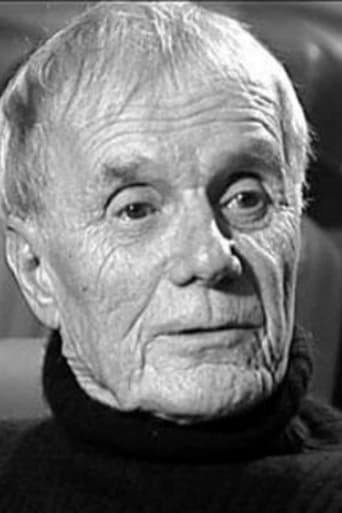Tockinit
not horrible nor great
Roman Sampson
One of the most extraordinary films you will see this year. Take that as you want.
Hattie
I didn’t really have many expectations going into the movie (good or bad), but I actually really enjoyed it. I really liked the characters and the banter between them.
zainsolinski
Stylistically it's quite innovative for it's time, which will be obvious when considering it's a work of the French New Wave. The fact that the outside noise was edited out in order for a greater deal of focus on the actual conversation worked really effectively, and really got me more interested in what the characters were saying. Although this worked well as a frame for what was being said the actual content of the writing just served more as a way for Godard to push his political philosophy rather than develop a story with political depth, which is a shame considering the the subject's potential. Had he shown us more scenes like the one in the bathtub where we can actually experience the reality of the conflict rather than have Bruno banter at us while invoking Lenin and Guitry it would have worked much more effectively in conveying its message. That being said the film wastes so much time reading out like The Godardist Manifesto (which although I agree with does get tiring) that eventually Bruno's conflict with the job tasked to him along with his strategic dilemma with Veronique is resolved within the timespan of a quick one minute narration, which I personally thought didn't give it the gravitas it needed. You'll probably like this if you want to see Godard's early development, but keep in mind it's more like a warm-up act for Pierrot le Fou than anything.
Cosmoeticadotcom
Le Petit Soldat (The Little Soldier) was the second film written and directed by Jean-Luc Godard, pioneer of the French New Wave of film-making, and after the unexpected success of his first film, Breathless- a banal, poorly acted, and dull attempt at (or satire of?) film noir, this second film was greeted with a swift banning in France- for its portrayal of the similar way Right and Left Wing terror groups behave, and the fact that it had an implicitly anti-war message at a time when the French were trying to hold on to their colonial power in Africa during the Algerian War. Because it took so long to be screened around the world it has generally has been critically either wholly ignored or bitterly dissed. Yet- surprise, surprise- it's a significantly better film in all aspects than the much more lauded Breathless. That said, it's merely a solid film, not even particularly good, but it does display that Godard was not merely out to ape his earlier success the way that many young artists do.The tale is not particularly complex, as it involves espionage and torture- things that would soon become glamorized in the filmic world of James Bond just a few years hence, but it has a far more naturalistic feel than Breathless does- which was filled with artistic preening and posing, simply because there is no self-conscious effort to 'be natural' in this film. The tale follows Bruno Forestier (Michel Subor- who looks remarkably like a young Harvey Keitel), a young Frenchman who deserted the army, and is living in exile in Geneva, Switzerland. He is narrating the tale from an indeterminate point in the future, so we know he will likely survive the film's ordeal- it's the how and why of the film that will thus be its determining factor in success or failure. Ostensibly he's a reporter, yet he has nebulous ties to some Right Wing terror groups. Because he deserted the army he is blackmailed by them to do criminal 'jobs' for them. They distrust him, suspect him of being a sellout, and order him to kill a man to prove his loyalty. He refuses- as he seems to have a conversion just seconds before doing the deed, and falls out with his comrades. Yet, he is also feared and disdained by Left Wing terrorists from Algeria, who treat him with equal disgust. The sign of a movie with impact is how relevant it can feel to audiences at any give time, and, in this regard, Le Petit Soldat also surpasses Breathless in every way, for the relevance to today's situations in the Middle East is not that much different…. Overall, this film has a similar feel to John Cassavetes' work in America at the same time. While Godard's films have often been compared to what came before them- the pulp detective novels of the 1940s and 1950s, I see them as having more in line with what has come later- the graphic novels of the last twenty or so years, for often his deliberately ill composed frames are like comic book characters who convey kinetic energy by reaching out of the frames. Similarly, all of his characters tend to speak in highly stylized ways. We also get many ellipses in the action, with jump cuts. The most effective one is when Bruno escapes from his Left Wing torturers and crashes through a window. In true comic book fashion, he explains it all simply to Monica as if it were just another thing to do between smoking a cigarette and picking up a pound of ham at the corner delicatessen.Moments like that, and the other pluses of the film, are enough to recommend this film as the work of someone with boldness and talent, who does fail as often as he succeeds, but which augured a brighter future. Only time would reveal which side of Godard would win- the banal noirist obsessive or the inventive and insistent innovator. Le Petit Soldat answers few questions within its frames, and that most important one, too, remains unanswered without its frames.
Daryl Chin (lqualls-dchin)
"Le Petit Soldat" was made right after "Breathless", with Raoul Coutard continuing to experiment with hand-held black-and-white cinematography; it was the first film that Jean-Luc Godard made with Anna Karina, and the film has many passages which are hymns to her beauty (the most famous being the photography session with freeze-frames, a scene which John Schlesinger copied in "Darling"). Though I love early Godard, this one is fascinating, but it's also politically murky: the very real issues of the Algerian War are treated in ways which are confusing, sometimes facetious, and often distressing. But the romantic agony at the core of the film makes it very touching. It would be Godard's most passionately tragic film until "Pierrot le Fou", and the couple played by Michel Subor and Karina remain perhaps Godard's most heartbreaking.
zetes
And it's simply criminal that it is so unavailable. Turner Classic Movies has the rights to play it and has twice in 2001, but the film has never been available on video, at least not in the US. Le petit soldat can be very hard to follow at times, and it certainly drags a bit nearer the start, but once it gets going, it escalates into a very powerful dramatic experience. Michel Subor and Anna Karina, in her first collaboration with her soon-to-be husband Godard, are excellent as two people who work for opposite causes who meet and fall in love. The film is very moody, and often very suspenseful. The music, by Maurice Leroux, is a simple but effective piano score, played in a tragic key. The romance is not beautiful, but is also played for tragedy. Jean-Luc Godard is a name that most film lovers will know. Most of them will have seen or will someday see Breathless (A bout de souffle), his first and most famous film. Many others will find other films like Contempt, Alphaville, Pierrot le fou, Vivre sa vie (My Life to Live), and Weekend. But this great auteur, more than almost any other, has so many great forgotten works that it particularly depresses me. Le petit soldat is one of the best (I give it a 9/10). Also valuable and underseen are Une femme est une femme, Les carabiniers, Bande a part (Band of Outsiders), First Name: Carmen, Hail Mary, and his segment from Aria, to name just the ones I have seen. There are many, many more after that.

